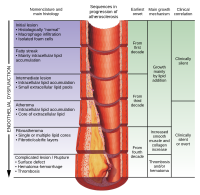
Photo from wikipedia
BACKGROUND AND AIMS Intracranial atherosclerosis (ICAS) is a predictable and preventable condition, but existing evidence concerning its risk factors has not been quantitatively assessed. The aim of this meta-analysis is… Click to show full abstract
BACKGROUND AND AIMS Intracranial atherosclerosis (ICAS) is a predictable and preventable condition, but existing evidence concerning its risk factors has not been quantitatively assessed. The aim of this meta-analysis is to identify the non-modifiable and modifiable risk factors for ICAS. METHODS PubMed and EMBASE were searched (1995-May 15, 2018) for cross-sectional and longitudinal studies exploring risk factors for ICAS. The risk estimates and 95% confidence intervals (CIs) in multivariate analysis were aggregated using random-effect models. RESULTS Thirty-four studies comprising 59,736 subjects met the inclusion criteria for the systematic review involving thirty-one risk or protective factors. Seven factors were associated with ICAS, as suggested by the meta-analysis, including advanced age (odds ratio (OR) 1.05, 95% CI 1.03-1.08), metabolic syndrome (OR 2.13, 95% CI 1.35-3.37), diabetes mellitus (OR 1.98, 95% CI 1.69-2.31), hypertension (OR 1.97, 95% CI 1.69-2.31), dyslipidemia (OR 1.29, 95% CI 1.04-1.59), high levels of low-density lipoprotein cholesterol (OR 1.06, 95% CI 1.00-1.12) and high levels of apolipoprotein A1 (OR 0.34, 95% CI 0.15-0.75). The subgroup analysis for study populations indicated advanced age, metabolic syndrome, diabetes mellitus and hypertension as an elevated risk of ICAS among community subjects and stroke patients; according to the subgroup analysis for ethnicity, similar associations remained in Asians, but only metabolic syndrome and diabetes mellitus were correlated with ICAS in Caucasians. CONCLUSIONS Individuals with advanced age, metabolic syndrome, diabetes mellitus, hypertension and dyslipidemia might have a higher risk of ICAS, whereas high levels of apolipoprotein A1 might protect against ICAS.
Journal Title: Atherosclerosis
Year Published: 2019
Link to full text (if available)
Share on Social Media: Sign Up to like & get
recommendations!